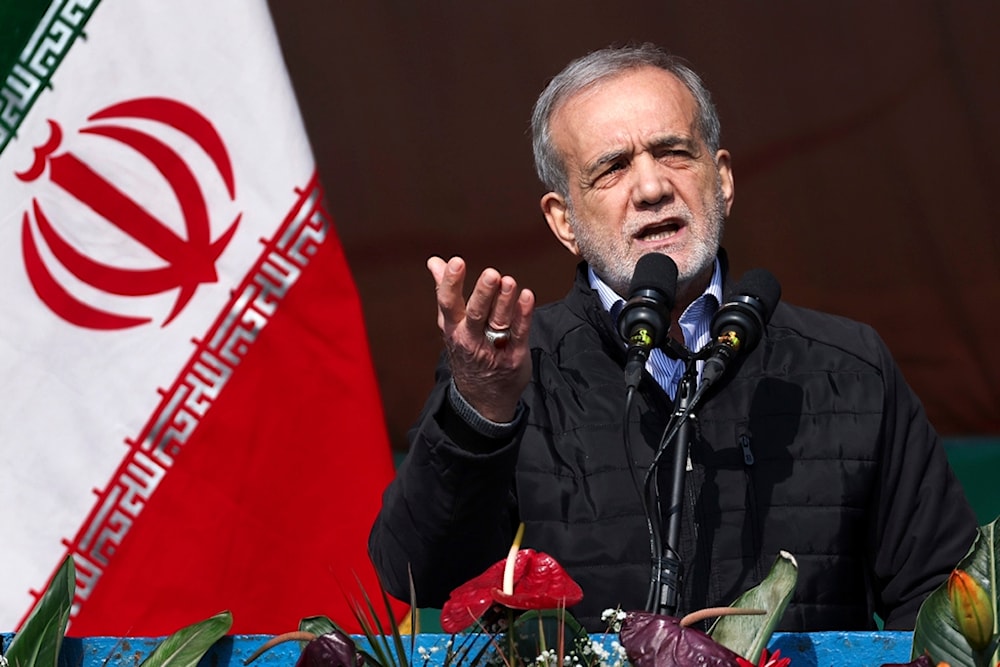Iran president rules out direct talks with US, says indirect ones open
Turning to developments in Palestine and Lebanon, the Iranian president strongly condemned the Israeli regime’s ongoing violations, calling for an immediate end to its crimes.
-
 In this photo released by the Iranian Presidency Office, President Masoud Pezeshkian speaks during a rally commemorating the anniversary of the 1979 Islamic Revolution that toppled the late pro-US Shah Mohammad Reza Pahlavi, in Tehran, Iran, Monday, Feb. 10, 2025 (Iranian Presidency Office via AP, file)
In this photo released by the Iranian Presidency Office, President Masoud Pezeshkian speaks during a rally commemorating the anniversary of the 1979 Islamic Revolution that toppled the late pro-US Shah Mohammad Reza Pahlavi, in Tehran, Iran, Monday, Feb. 10, 2025 (Iranian Presidency Office via AP, file)
Iran has ruled out direct negotiations with the United States in its response to a letter from the American president but has expressed openness to indirect talks, Iranian President Masoud Pezeshkian stated.
Speaking at a cabinet meeting on Sunday, Pezeshkian confirmed that Iran’s reply to the letter of US President Donald Trump was conveyed through Oman.
He emphasized that while Iran has rejected direct talks, it has never closed the door to indirect negotiations.
"As the Islamic Republic had never blocked the paths of indirect negotiations before, this letter (Iran’s reply) has also mentioned that the road to indirect negotiation is left open and has emphasized that Iran has never avoided negotiations,” he indicated.
The Iranian president attributed challenges in the negotiation process to the United States’ lack of commitment, stressing that past mistakes must be rectified and trust restored.
“This will be the manner of Americans that would determine the continuity of the course of negotiations,” Pezeshkian pointed out.
Confidentiality in talks with US aligns with national interests: Iran
Earlier on Sunday, the Iranian Foreign Ministry said that maintaining the confidentiality of negotiations and international correspondence and refraining from disclosing details of diplomatic processes is a professional practice aligned with national interests.
In a statement in response to media reports regarding the method of message exchanges between the US and Iran, the ministry emphasized that this approach "will continue as long as the country's interests require it."
"Insisting on publicizing ongoing correspondence and interactions between states, using misleading terms such as concealing information from the people, is, at best, unnecessary noise aimed at creating psychological tension in society," the statement indicated.
In a related context, Iranian government spokesperson Fatemeh Mohajerani confirmed that indirect negotiations with the US have been placed on the agenda.
Trump had initially sent his letter to Iran on March 12 via the United Arab Emirates (UAE). While the content of the letter has not been officially disclosed, the US president has indicated that he proposed opening negotiations for a new nuclear agreement. Trump unilaterally withdrew the United States from a previous deal with Iran in 2018.
Iranian Foreign Minister Abbas Araghchi reiterated on Thursday that Iran remains open to indirect negotiations but will not engage in direct talks while subjected to the US' "maximum pressure" policy and military threats.
Last week, Araghchi said Trump's letter was "actually more of a threat" than an offer. Trump's letter reportedly set a two-month deadline for Iran to agree to a new nuclear deal or face potential military action.
Pezeshkian strongly condemns Israeli atrocities
Turning to developments in Palestine and Lebanon, Pezeshkian strongly condemned the Israeli regime’s ongoing violations, calling for an immediate end to its "inhumane and unacceptable" crimes.
Earlier this month, "Israel" renewed its war on the Gaza Strip, reneging on a ceasefire agreement that maintained two months of relative calm. Additionally, the occupation military continues to carry out strikes on Lebanese territory and maintains a presence in five locations in southern Lebanon, near the border with occupied Palestine, despite a ceasefire agreement that ended an Israeli war on Lebanon.
"No honorable human being can remain silent in the face of such atrocities," Pezeshkian stressed.
He denounced "Israel" for breaching a ceasefire agreement with Lebanon and targeting innocent civilians in its attacks.
The Iranian president concluded by praying for greater unity and solidarity among Muslim nations in response to "Israel’s" atrocities.
Read more: Iran says US letter opened new window for diplomacy

 4 Min Read
4 Min Read








